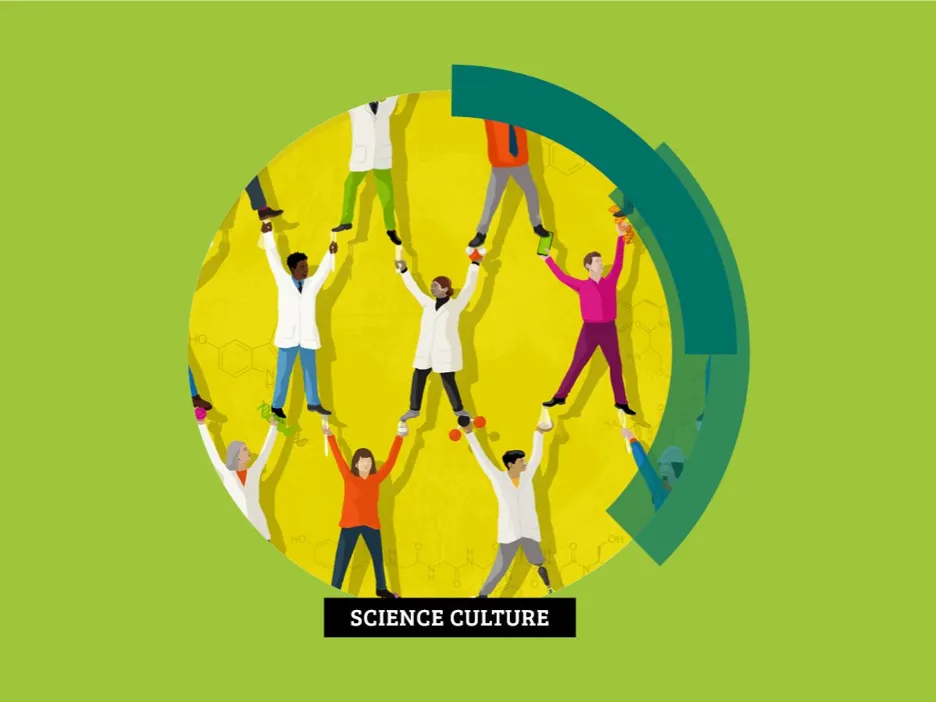Science culture
Chemistry should be for everyone

We recognise the importance of valuing all members of our community; we believe that for the chemical sciences to prosper, they must attract, develop and retain a diverse range of talented people.
As a professional and membership body, and a leading voice for the chemistry community, we have a responsibility to promote inclusivity and accessibility in order to improve diversity.
Our goal is to increase the diversity of people choosing and fulfilling their potential in the chemical sciences for a truly inclusive community.
The key aims of our strategy to 2025
- To collate, analyse and use data to ensure an evidence-driven approach.
- To investigate perceptions of who can be a chemical scientist.
- To support early career chemists encompassing all career routes to the profession.
- To ensure fair and equal progression for talented chemical scientists.
- To learn from, and share with, our global partners the insight, knowledge and tools to progress inclusion and diversity across the chemical sciences worldwide.
This strategy will run until 2025. To ensure that it has the desired impact, we will continue to develop a range of measures to monitor progress and the impact of our work. These include:
- Measuring the number of partners we successfully work with and provide expert advice to
- Engagement of key stakeholders and champions to foster change in the culture of chemistry
- The improvement in diversity resulting from our work
Equality
Often referred to as equality of opportunity, the concept of equality is primarily centred on complying with the Equality Act 2010. The Act makes it unlawful to discriminate, harass or victimise someone because they have or are perceived to have a ‘protected characteristic’ or are associated with someone who has a protected characteristic. The "protected characteristics" under the Act are:
- age
- gender reassignment
- being married or in a civil partnership
- being pregnant or on maternity leave
- disability
- race (including colour, nationality, ethnic or national origin)
- religion or belief
- sex
- sexual orientation
All people in Britain are protected by this legislation – not only underrepresented groups.
Diversity
We define diversity in its broadest sense, encompassing similarities and differences of culture, background and experience. In addition to the protected characteristics of the Equality Act 2010, we recognise other characteristics within our definition of diversity:
- career path and stage
- communication style
- education
- experience
- first language
- geography
- job sector
- socioeconomic status
- political affiliation
Inclusion and inclusiveness
The process of inclusion engages each individual and makes people feel essential to the success of the organisation. Individuals function at full capacity, feel more valued, and are included in the organisation’s mission. The culture shift creates higher performing organisations where motivation and morale soar.
Miller and Katz (2002)
Inclusion is about the culture, environment, and processes created by an organisation. It is measured by how people feel and requires effort to achieve. Creating a culture of inclusiveness is about establishing behaviours that support inclusion. Leaders have a critical role to play in this, as people often look to those in senior positions as role models for what is acceptable and what is the norm.
Implicit bias
Implicit bias, also known as unconscious bias, is the attitudes to race, gender and sexuality ‘programmed’ into us by society. These biases affect everyone, regardless of their personal characteristics, and majorly impact everyone’s working life. There are a number of online resources on this topic:
- We produced a video explaining implicit bias
- Harvard University has produced an online test to identify potential implicit biases
- Chemistry World investigated implicit bias in the chemistry community, including testing their own biases
Our campaigns
Read about our influential and wide-ranging work to make chemistry more welcoming to everyone.

A framework for action in scientific publishing
Improving inclusion and diversity in the chemical sciences.

A vision for science culture
We envision a science culture that supports an open, inclusive and enabling community for the benefit of everyone.

Belonging in the chemical sciences
The first ever study of chemical scientists’ lived experiences of belonging in the chemical sciences.

Black representation in UK academic chemistry
The data show that there is an under-representation of ethnic minorities and there is a clear retention problem.

Women's retention and progression in chemical sciences
Talented women leave academia before reaching their full potential or are not progressing to senior grades in the same proportion as their male peers.

Disability in the chemical sciences
We share what we have learnt from those in our community with experience of disability and suggest how organisations can improve disability inclusion.
Recent news

Inclusion and Diversity Forum 2025
02 April 2025
LGBT+ Inclusion in STEM grant holders in the spotlight
20 March 2025
Neurodiversity case study: Scottish Water and Genius Within
17 March 2025
Evolving our inclusion and diversity strategy
21 February 2025
Disability History Month, December 2024
05 December 2024
Efforts to remove stigmas of neurodiversity take another step forward with publication of RSC report
10 October 2024
Neurodiversity in the chemical sciences
01 October 2024
Our research community
A framework for action in scientific publishing
Improving inclusion and diversity in the chemical sciences.
Joint commitment for action on inclusion and diversity in publishing
Collective action to make things better, together.
Inclusion and diversity in peer review
Building a fairer landscape for the scientific community ensures that impactful research can come from anywhere and anyone.